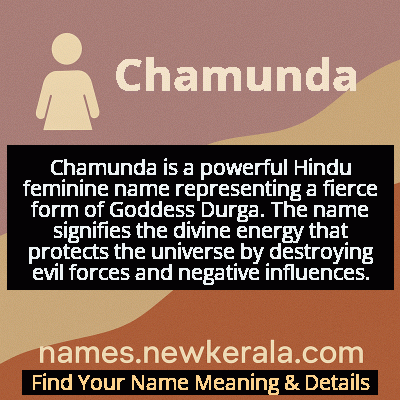Chamunda Name Meaning & Details
Origin, Popularity, Numerology Analysis & Name Meaning of Chamunda
Discover the origin, meaning, and cultural significance of the name CHAMUNDA. Delve into its historical roots and explore the lasting impact it has had on communities and traditions.
Name
Chamunda
Gender
Female
Origin
Hindu
Lucky Number
2
Meaning of the Name - Chamunda
Chamunda is a powerful Hindu feminine name representing a fierce form of Goddess Durga. The name signifies the divine energy that protects the universe by destroying evil forces and negative influences.
Chamunda - Complete Numerology Analysis
Your Numerology Number
Based on Pythagorean Numerology System
Ruling Planet
Moon
Positive Nature
Diplomatic, friendly, artistic, empathetic.
Negative Traits
Over-sensitive, moody, indecisive, prone to self-pity.
Lucky Colours
Green, cream, white.
Lucky Days
Monday.
Lucky Stones
Pearl, moonstone.
Harmony Numbers
1, 3, 4.
Best Suited Professions
Diplomats, mediators, caregivers, artists.
What People Like About You
Cooperative spirit, friendliness, artistic talent.
Famous People Named Chamunda
Chamunda Devi
Spiritual Leader
Renowned temple priestess and spiritual guide in Himachal Pradesh
Chamunda Swami
Yogi
Influential female yogi known for spiritual teachings and meditation practices
Chamunda Bai
Social Reformer
Pioneering educator who established schools for girls in rural Rajasthan
Name Variations & International Equivalents
Click on blue names to explore their detailed meanings. Gray names with will be available soon.
Cultural & Historical Significance
Throughout Indian history, Chamunda has been worshipped as a guardian goddess, particularly in Shakta traditions where she represents the destructive aspect of the divine feminine necessary for cosmic balance. Major temples dedicated to Chamunda, such as the Chamunda Devi Temple in Himachal Pradesh and Chamundeshwari Temple in Karnataka, have been centers of worship for centuries, attracting devotees seeking protection, courage, and liberation from negative influences. Her iconography typically depicts her with a fearsome appearance, adorned with garlands of skulls and seated on a corpse, symbolizing her triumph over mortality and ignorance.
Extended Personality Analysis
Individuals named Chamunda are often perceived as possessing strong, protective, and determined personalities, reflecting the goddess's warrior nature. They tend to be fiercely independent, courageous in facing challenges, and deeply principled in their convictions. Like their divine namesake who confronts darkness fearlessly, people with this name often demonstrate remarkable resilience and the ability to overcome significant obstacles in life. Their protective instinct extends to loved ones, making them loyal defenders of family and community.
However, this strength is typically balanced with profound compassion - while Chamunda the goddess destroys demons, she also liberates souls from suffering. Similarly, those bearing this name often combine their formidable will with deep empathy, using their strength to support and uplift others. They may possess strong intuitive abilities and a natural inclination toward spiritual pursuits, drawn to understanding life's deeper mysteries. Their leadership qualities often emerge in situations requiring moral courage and decisive action.
Modern Usage & Popularity
In contemporary times, Chamunda remains primarily used within Hindu communities, particularly in regions with strong Shakta traditions like West Bengal, Karnataka, and Himachal Pradesh. While not among the most common names, it maintains steady usage among families with deep religious connections or those seeking to honor the goddess's protective qualities. The name has seen a modest resurgence in recent years as parents look for traditional names with strong feminine energy and cultural significance. It's more frequently used in rural areas and among families preserving ancient traditions, though urban educated families also choose it for its powerful symbolism and connection to Indian heritage. The name is rarely used outside Hindu communities due to its specific religious connotations.
Symbolic & Spiritual Meanings
Chamunda symbolizes the transformative power of divine feminine energy that destroys negativity to create space for spiritual growth. She represents the necessary destruction of ego, attachment, and ignorance that prevents enlightenment. Her fearsome appearance symbolizes the courage required to confront one's inner demons and the ultimate victory of consciousness over unconscious forces. The skull garlands she wears signify her mastery over death and the transient nature of physical existence, while her emaciated form represents austerity and detachment from worldly desires. Chamunda embodies the paradox of destruction as an act of compassion - by eliminating negative forces, she liberates souls from suffering. She serves as a powerful reminder that true protection often requires confronting darkness directly rather than avoiding it.

